1. Political power isn't itself a moral good by which other objective morals can be discarded.
2. Ethical systems which seek to elevate political power are idolatrous and end up sacrificing faithfulness and gospel living.
3. Evangelicalism, and particularly the Religious Right, has a sordid past, which is particularly pronounced in regard to issues of race.
4. The Religious Right is infused with agendas and ideologies which aren't particularly Christian, though they are couched as such. Religious language is used to manipulate voters for their side, while dismissive names are assigned to any counter-ideology in order to prevent thoughtfulness or self-reflection.
5. Morality is more complex than weighing perceived evils and goods,
6. Sometimes, abstention from the system rather than an engagement in idolatry or complicity with evil is the most faithful and effective action we can perform.
Articles:
Can the Religious Right Be Saved?
Russell Moore, a Southern Baptist ethicist, gave a famous and fantastic speech about the moral concerns with our polarized politics, immoral candidates, and immoral platforms
Will Somebody Please Hate My Enemies For Me?
David French, a Christian, highlights what it seems most Christians have been readily willing to throw off for political gain - love - which is the core of the gospel
How Do Christians Fit Into the Two Party System? They Don't.
Tim Keller discusses the Christians call in light of a polarized political environment
The King's Chapel and the King's Court
Chuck Colson once said that the religious leaders were the easiest to manipulate with the splendor of political power. In this article, famed theologian Reinhold Niebuhr explains how the religious leaders often seek to be court prophets rather than the faithful, but less flattering, wilderness prophets.
Do Pro-Lifers Who Reject Trump Have Blood on their Hands?
Another David French article, this one helps to identify the problems of pragmatically using politics. Voting and legislating don't work out like we think they will. Furthermore, those who argue against trump (like this article), fail to realize that they condemn themselves by their own standards. If you vote Republican you may not have the blood of American unborn on your hands, but you have the lives of immigrants or foreign children slaughtered in our wars. That is why to holding French accountable undermines all political positions, since all are guilty of great evil.
Books:
The Color of Compromise
This book focuses on the history of how the church handles race, which is vital to grasp if you want to understand why racial issues still underlie some of our platform policies today (including abortion)
Revolution of Values
A former Southern Baptist man who worked under Strom Thurmond explains what he learned and saw which drove him away from the Religious Right and to the gospel
The Immoral Majority
Another Southern Baptist guy who was heavily connected to Liberty University, explains how the face of Evangelicalism in the Religious Right has driven him away from the party and to what he considers a holistic gospel position
One Nation Under God
Unlike the former two books, this book deals mostly with primary resources and has less interpretation. It explores the rise of the Religious Right and their commandeering of politics as a hammer for a particular agenda. The book is dry, but it explains a ton and is helpful in seeing how some of the terms came about (e.g. marxist, socialist, etc) which are now thrown out today to dismiss ideas rather than engaging them.
The Civil War as a Theological Crisis
Mark Noll is a historian who takes a look at the Civil war through the eyes of the church. He uses many primary sources. What I find particularly interesting about this book (combined with "One Nation Under God") is that you see the conservative brand of Christianity as always being on the wrong side of the race issue throughout history (slavery, Jim Crowe, interracial marriage, Civil Rights, etc). I think there are reasons for that, which these resources can help to draw out for you, and I don't think that blind spot has gone away for conservatives still.
Blinded by Might
Written by two guys who were in the Moral Majority at the height of its power. While I think Cal Thomas has is pretty politically involved now, he at least seemed to have a moment of clarity when he wrote this book. It is a pretty good, critical assessment of conservative politics assessment from a far right view.
Podcasts:
The And Campaign: A great resource from a Christian group which won't just have you looking at one party.
Politics, White Evangelicalism, and Race Relations in the Church
Preston Sprinkle interviews Justin Giboney from the & Campaign which seeks to get Christians thinking about overall morals and prevent straight party-line voting
The Problem with the Lesser of Two Evils Ethic
An exploration of why the lesser of two evils ethic doesn't work on a Christian moral system
The Argument for Abstention from Voting
Exploring how abstention from voting cannot only be the best moral option, but how it can also be the option which produces the best witness and the greatest effects
Choosing a Pastor in Chief?
Exploring ways in which leaders are to be assessed from a biblical standpoint and the inconsistency of holding a sacred/secular distinction only when its convenient
The Influence of Race on Evangelicalism's Anti-Abortion Position
A brief look at just one of the problems with viewing abortion as a one issue qualifier in elections
Quotes:
Soren Kierkegaard -
- The state is continually subject to the same sophistry that engrossed the Greek Sophists – namely, that injustice on a vast scale is justice. Yes, politics is nothing but egotism dressed up as justice.
- That the goal of the state is to improve its citizens – is obviously nonsense. The state is of the evil rather than of the good, a necessary evil, in a certain sense a useful, expedient evil, but not a good. The state is actually human egotism in great dimensions. Just as we speak of a calculation of infinitesimals, so also the state is a calculation of egotisms, but always in such a way that it egotistically appears to be the most prudent thing to enter into and to be in this higher egotism. But this, after all, is anything but the moral abandoning of egotism. To be improved by living in the state is just as doubtful as being improved in a prison. Perhaps one becomes much shrewder about his egotism, his enlightened egotism, that is, his egotism in relation to other egotisms, but less egotistic he does not become, and what is worse, one is spoiled by regarding this official, civic, authorized egotism as virtue – this, in fact, is how demoralizing civic life is, because it reassures one in being a shrewd egotist.
- For so many, the state is counted on to develop people morally, to be the proper medium for virtue, the place where one really can become virtuous! But to believe this is like believing that the best place for a watchmaker or an engraver to work is aboard a ship in a heavy sea. Christianity does not believe that the Christian is to remain in the body politic for the purpose of moral improvement – no, in fact it tells him in advance that it will mean suffering.
- As soon as the thought of human assistance arises, of not refusing the help of the world, all is essentially lost. The faith in martyrdom as having value in and by itself is thereby abandoned, and Christianity runs downhill until, just as the Rhine ends in mud, it ends in the mud of politics.
- On their part the clergy think it very prudent to accept the protection of the state. They understand, all right, that it is considerably more pleasant to be a hired servant of the state than to serve Christianity according to New Testament. But this prudence is not only short-sighted, it is blasphemy.
- What Christianity needs is not the suffocating protection of the state; no, it needs fresh air, it needs persecution, and it needs God’s protection. The state only works disaster, it wards off persecution and thus is not the medium through which God’s protection can be conducted. Above all, save Christianity from the state. By its protection it smothers it to death.
- The state thinks it prudent to accommodate Christ’s teaching in order to tranquilize people and thus be better able to control them. The state never accommodates Christianity in its truth (as salt in character); it rather has it up to a point, which we “Christians” are also happy to have.
Henry David Thoreau -
- I cast my vote, perchance, as I think right; but I am not vitally concerned that that right should prevail. I am willing to leave it to the majority. Its obligation, therefore, never exceeds that of expediency. Even voting for the right is doing nothing for it. It is only expressing to men feebly your desire that it should prevail. A wise man will not leave the right to the mercy of chance, nor wish it to prevail through the power of the majority. There is but little virtue in the action of masses of men. When the majority shall at length vote for the abolition of slavery, it will be because they are indifferent to slavery, or because there is but little slavery left to be abolished by their vote.
Cornel West -
- The canonical articulation of paternalistic nihilism is put forward in Fyodor Dostoyevsky’s The Brothers Karamazov in the character of the Grand Inquisitor, a terribly disillusioned priest in the city of Seville during the time of the Spanish Inquisition. So cynical has the Grand Inquisitor become that although he knows the abuses of the Inquisition are a horrible perversion of the teachings of Christ, perpetrated by a terribly corrupted church, he nevertheless takes part in those abuses—condemning many supposed infidels to death. He has come to believe that the corrupted church is the best that mankind can hope for because human society is simply not capable of living in the way Christ instructed. We are not capable of achieving the world of equality, humility, and compassionate caring that He instructed mankind to strive for. Better not to rock the boat with pipedreams of a radical transformation of society. The elite of the church can do more good, the Inquisitor believes, by working within the corrupted system, paternally deceiving the public, shielding society from the terrible burden of the mandates of truth. He has cast his lot with corruption.
- Most American Constantinian Christians are unaware of their imperialistic identity because they do not see the parallel between the Roman empire that put Jesus to death and the American empire that they celebrate. As long as they can worship freely and pursue the American dream, they see the American government as a force for good and American imperialism as a desirable force for spreading that good. They proudly profess their allegiance to the flag and the cross not realizing that just as the cross was a bloody indictment of the Roman empire, it is a powerful critique of the American empire, and they fail to acknowledge that the cozy relation between their Christian leaders and imperial American rulers may mirror the intimate ties between the religious leaders and imperial Roman rulers who crucified their Savior. I have no doubt that most of these American Constantinian Christians are sincere in their faith and pious in their actions. But they are relatively ignorant of the crucial role they play in sponsoring American imperial ends. Their understanding of American history is thin and their grasp of Christian history is spotty, which leaves them vulnerable to manipulation by Christian leaders and misinformation by imperial rulers. The Constantinian Christian support of the pervasive disinvestment in urban centers and cut-backs in public education and health care, as well as their emphatic defense of the hard-line policies of the Israeli government, has much to do with the cozy alliance of Constantinian Christian leaders with the political elites beholden to corporate interests who provide shelter for cronyism. In short, they sell their precious souls for a mess of imperial pottage based on the false belief that they are simply being true to the flag and the cross. The very notion that the prophetic legacy of the grand victim of the Roman empire—Jesus Christ—requires critique of and resistance to American imperial power hardly occurs to them.
- Never before in the history of the American Republic has a group of organized Christians risen to such prominence in the American empire. And this worldly success—a bit odd for a fundamentalist group with such otherworldly aspirations—has sent huge ripples across American Christendom. Power, might, size, status, and material possessions—all paraphernalia of the nihilism of the American empire—became major themes of American Christianity. It now sometimes seems that all Christians speak in one voice when in fact it is only that the loudness of the Constantinian element of American Christianity has so totally drowned out the prophetic voices. Imperial Christianity, market spirituality, money obsessed churches, gospels of prosperity, prayers of let’s-make-a-deal with God or help me turn my wheel of fortune have become the prevailing voice of American Christianity. In this version of Christianity the precious blood at the foot of the cross becomes mere Kool-Aid to refresh eager upwardly mobile aspirants in the nihilistic American game of power and might. And there is hardly a mumbling word heard about social justice, resistance to institutional evil, or courage to confront the powers that be—with the glaring exception of abortion.
- Philanthropy is fine, but what of justice, institutional fairness, and structural accountability?
- Justice is what love looks like in public.
William Sloane Coffin -
- No nation, ours or any other, is well served by illusions of righteousness. All nations make decisions based on self-interest and then defend them in the name of morality.
Dietrich Bonhoeffer and the book "Bonhoeffer the Assassin" -
- “Nationalism and internationalism have to do with political necessities and possibilities. The ecumenical Church, however, does not concern itself with these things, but with the commandments of God, and regardless of consequences it transmits these commandments to the world. Our task as theologians, accordingly, consists only in accepting this commandment as a binding one, not as a question open to discussion. Peace on earth is not a problem, but a commandment given at Christ’s coming. There are two ways of reacting to this command from God: the unconditional, blind obedience of action, or the hypocritical question of the Serpent: “Yea, hath God said . . . ?” This question is the mortal enemy of obedience, and therefore the mortal enemy of all real peace. . . . “Must God not have meant that we should talk about peace, to be sure, but that it is not to be literally translated into action? Must God not really have said that we should work for peace, of course, but also make ready tanks and poison gas for security?” And then perhaps the most serious question: “Did God say you should not protect your own people? Did God say you should leave your own a prey to the enemy?” No, God did not say all that. What He has said is that there shall be peace among men—that we shall obey Him without further question, that is what He means. He who questions the commandment of God before obeying has already denied Him. . . . For the members of the ecumenical Church, in so far as they hold to Christ, His word, His commandment of peace is more holy, more inviolable than the most revered words and works of the natural world. For they know that whoso is not able to hate father and mother for His sake is not worthy of Him, and lies if he calls himself after Christ’s name. These brothers in Christ obey His word; they do not doubt or question, but keep His commandment of peace. They are not ashamed, in defiance of the world, even to speak of eternal peace. They cannot take up arms against Christ himself—yet this is what they do if they take up arms against one another! Even in anguish and distress of conscience there is for them no escape from the commandment of Christ that there shall be peace. How does peace come about? Through a system of political treaties? Through the investment of international capital in different countries? Through the big banks, through money? Or through universal peaceful rearmament in order to guarantee peace? Through none of these, for the single reason that in all of them peace is confused with safety. There is no way to peace along the way of safety. For peace must be dared. It is the great venture. It can never be made safe. Peace is the opposite of security. To demand guarantees is to mistrust, and this mistrust in turn brings forth war. To look for guarantees is to want to protect oneself. Peace means to give oneself altogether to the law of God, wanting no security, but in faith and obedience laying the destiny of the nations in the hand of Almighty God, not trying to direct it for selfish purposes. Battles are won, not with weapons, but with God. They are won where the way leads to the cross. Which of us can say he knows what it might mean for the world if one nation should meet the aggressor, not with weapons in hand, but praying defenseless, and for that very reason protected by “a bulwark never failing”?
- The penultimate must be preserved for the ultimate, even as the ultimate upholds the value of the penultimate. This, in part, is where Bonhoeffer’s thinking in “Christ, Reality, and Good” is headed. As we further track the structure of his logic in the formative manuscript, we see that since God is the ultimate reality, the purpose of Christian ethics is not moral growth or “making the world a better place,” as some ethical systems would have it, but witness to God’s ultimate goodness, even if such a witness comes at the expense of improvement. 388 This does not mean, of course, that the pursuit of theocentric goals will inevitably lead to demoralization, guilt, or neglect of the world’s needs, but it does at least radically transform the rationale for pursuing these penultimate ends even as it may call them into question more broadly.”
Dave Chappelle -
- ...ethics aren't what they used to be...people are trying to replace the ideas of "good" and "bad" with "better" or "worse." And that is incorrect. You have to keep your ethics in tact because "good" and "bad" is a compass that helps you find your way. And a person that only does what’s better and worse is the easiest type of person to control. They are a mouse in a maze that just finds the cheese. But the one who knows about good and bad will know he’s in a maze.
Alan Kreider -
- When people challenge them about their faith, Christians use their unique apologetic— they talk about how they live: “We teach, we show, we demonstrate.” In this apologetic all believers—not only the literate Christians—are important: “Our old women and our children” also make the case for Christianity.
- Lactantius is categorical: religions that do not bring vital life to ordinary people will atrophy. Christians know that no amount of force can establish a religion securely and profoundly.
Stanley Hauerwas -
- Just to the extent that we have been taught to hope, we must also be patient. God does not will that the Kingdom be accomplished through coercion or violence. In the cross, we see how the Kingdom will come into the world, and we are charged to be nothing less than a cruciform people. We must, then, learn to wait as we seek to manifest to the world God’s peace which comes into our lives by no other means than the power of that truth itself. Such waiting is painful indeed in a world as unjust and violent as ours. But we believe it justified, since we have been promised that God will use our waiting for the complete triumph of the Kingdom. Moreover, patience is required because at least part of what it means for the church to be, rather than to have a social ethic involves a rethinking about what is meant by social ethics. Too often, in an effort to appear socially relevant, the church has accepted the world’s agenda about what “real” politics involves. Thus, calls for us to serve the world responsibly have too often resulted in the church simply saying to the world what the world already knows. We thereby end up trying to secure “justice” that is only the continuation of some people’s domination over others.
- In this respect, the church as a social ethic must take its lead from those like Mother Teresa. From a perspective that would associate the church’s social task with effectiveness, Mother Teresa is a deeply immoral woman. She takes the time to hold the hand of a dying leprosy victim when she could be raising money in Europe and America for the starving in India. Yet, she sits holding the hand of a dying person – doing that while surrounded by unbelievable suffering and injustice – because she knows that by exactly such care God will have the Kingdom come. And she knows she can do so because she does not seek to be like the powerful to help the poor and dying. She has learned instead that power derives from being faithful to God’s kingdom of the poor.
John Howard Yoder -
- This reorientation means that we derive our ethics from the imperative to make history come out right through our actions. God has no way to make history come out right except through our running it, so it is God's responsibility, not ours, when we change our ethics in order to help God win. We are unselfish in the matter. We are just helping God run God's world. That is the first new assumption about the logic of ethics. We have to enable Caesar, who is our man, to win.
- To love one's enemies, to be a servant, and to be meek, are themselves more adequate definitions of doing God's will than are tactical projections about how to cause certain desirable states in the larger social system.
- ...if the resurrection is in some sense a model for the believer's life...then we have to look at the available options in the conviction that there are more options than the greater-evil option and a lesser-evil option. The present meaning of resurrection for ethics is that we are never boxed in. As believers, we are not to be calculating on the basis of the assumption that we are boxed into a world in which there are no new options. Many "saving" events in history were unforseeable, unplanned, but they happened. The Resurrection was an impossible unforseeable new option, and it happened. We do not know what happened in such a way that we could take it to the American Medical Association and show them what the shape of the corpse is in now. We cannot show them how resurrection works with modern, scientific, causal models. Yet we are committed to confessing as relevant for our ethics that there is a power in history that reaches beyond the boxes in which we find ourselves. So one more reason that the cross is meaningful is that even though it fails, it does not fail if there is resurrection. You cannot translate that reality into pagan social science until after it has happened. When you think you are in a blind alley, you do not know that the new thing can happen until it happens. Once the new thing happens, of course, then it was possible. Look at some of the most striking events that now matter for our history. They could not have happened. The Montgomery bus boycott should not ever have happened in terms of ordinary social pressure...
- The challenge that Jesus puts to the whole mainstream of Western Protestant culture is so total, so global, that we can understand why the West had to develop a different Jesus, a modernized Jesus, whose import for ethics would be more compatible with America. It does not matter whether scholars could show historically some relation between this Jesus and the Jesus of the Gospels. Whatever is discovered about Jesus in the ancient context does not really mater to the liberal Protestant emphasis. Its Jesus has to fit this modern optimism about the doability of God's will and the usability of the structures of our society to do it.
- Likewise, the people who say, "You must simply be true to God[or to yourself or to your son science] and let the heavens fall," are really saying that if the heavens fall, God has a better set of heavens ready. So they are not really thumbing their noses at results. They are trusting the God who gave us the rules to know more than we know about the results.
- The person who says, "You must give up some of your scruples in order to be effective," is still saying that the goal for which you should sacrifice scruples in order to be effective is in principle a good goal. So the argument that takes the clothing of principles versus effectiveness really means this principle versus that principle.
- To claim that human nature is such that in the average or typical situation, one must always choose something that is objectively evil, is to seriously foreshorten the task of moral analysis. From a more traditional Christian perspective, it is to deny the Christian doctrines of incarnation and sanctification. If genuinely effective faithfulness is not a possibility within history, then what Christianity classically affirms under the heading of the sinlessness of Jesus Christ would be excluded by definition, and sanctification would likewise be rejected a priori.
- Parts of the Reformation saw moral scrupulosity as a bad thing. "Don't be picky about living morally; after all, we are all sinners? What really matters is the message of salvation by grace. If something in the political realm isn't morally clean, don't be uptight about it. Just come to church and be forgiven." The message of forgiveness may work against being petty in moral scrupulosity, and the people who said these things did not intend that one should have no principles at all. They were not antinomian. Pastorally, however, they said that people should not be preoccupied with not doing wrong, because people can never completely avoid doing wrong. The main thing is to have a robust conscience, so that we can live with the limits of the human condition and not be depressed, because we live by grace. The whole idea of morality is not meant to exercise restraint. That is an un-Protestant idea. Morality is for positive guidance, to give us a good conscience and motivation. The primary function of morality is not to tell us what we should not have done.
- The relevance of a transcendent hope may sometimes be that of the spring in the desert. If, in a desert region, water can be found, it is because in some distant and unknown place incalculable quantities of water have sunk into the ground and disappeared. Only because of that infiltration in some distant place, continuing over a long time and developing pressure in a stratum of porous rock, can water be carried under the desert soil. Far away, it can be found as a seemingly miraculous source of sustenance. So it is with deeds of Christian obedience. Lost in the earth, filtering away without being seen or heard, they contribute to the building up of pressure, creating a subterranean reservoir of saving and invigorating power which can be tapped at the point where men are most thirsty. Sociologists may speak of it as the creation of custom, the development of public opinion, or the raising of the general level of capacity for generous conduct. All of these are simply other ways of affirming that the relationship between my obedience and the accomplishment of the purposes of God must include my losing track of my own effectiveness in the great reservoir of the pressure of love.
- The relevance of a transcendent hope may be that of a mirage. If we are speaking of a mirage and not of a hallucination, then what the voyager sees is real. It is not on the immediate horizon where he sees it, but it is truly there. It has that shape and is really off in that direction. He will not be able to reach that goal as soon as it seems that he ought to, but what he sees is of the same shape and quality as the reality of his destiny and it lies in the same direction. When the multitudes who had supported the civil rights campaign in the United States sang in the streets of “freedomland” as if it were just around the corner, that was a mirage. Even the most effective efforts to do away with racial injustice will still leave for generations the traces of that evil to be compensated for, repaired, and rebuilt. But the effort is nonetheless justified by the vision of that city on a mountain to which God will call all the nations in the last days so that they may learn the law of the Lord and convert their weapons into instruments of culture. We are not marching to Zion because we think that by our own momentum we can get there. But that is still where we are going. We are marching to Zion because, when God lets down from heaven the new Jerusalem prepared for us, we want to be the kind of persons and the kind of community that will not feel strange there.
- Whey then is it reasonable that we should continue to obey in a world which we do not control? Because that is the shape of the work of Christ. The relation between our obedience and the achievement of God’s purposes stands in analogy to the hidden lordship of him who was crucified and raised. It is reasonable because there is the continuing relevance of the sign. When Jesus washed the feet of his disciples, he made no abiding contribution to the hygiene of Palestine. Nevertheless, this act took a position in the world which has in itself both spiritual and ethical value. Similarly, when Christians devote themselves to the care of the seriously ill, of the mentally retarded, of the improductive aged, the fruitfulness of this service cannot be measured by any statistical index of economic efficacy. Whether evaluated from the perspective of the individual or the society, the meaning of this deed is what it signifies, the reality for which it is the sign, namely, that this man is here to be the servant of his neighbor. His presence and his posture, not his productivity, are the referent of the sign.
- America has become for its citizens a substitute church. It is from the nation and not the church that man expects salvation in history. It is not the church but the F.B.I. which people are willing to trust to investigate one another’s moral character and to decide who is and is not in the community. Now if our hope is that of the American religion, it will be appropriate for our churches to strengthen the moral conviction of our civilization by having nothing to say but “God bless America.” Similarly, if our hope were that of Marxism, then we would believe that it is through our party’s taking over the reins of society that the meaning of history will find its fulfillment. Then our hope for the world would appropriately include the need to rule the world and make every kind of compromise, concession and strategic zigzag that is needed for the party to achieve this end. The Christian community is the only community whose social hope is that we need not rule because Christ is Lord.
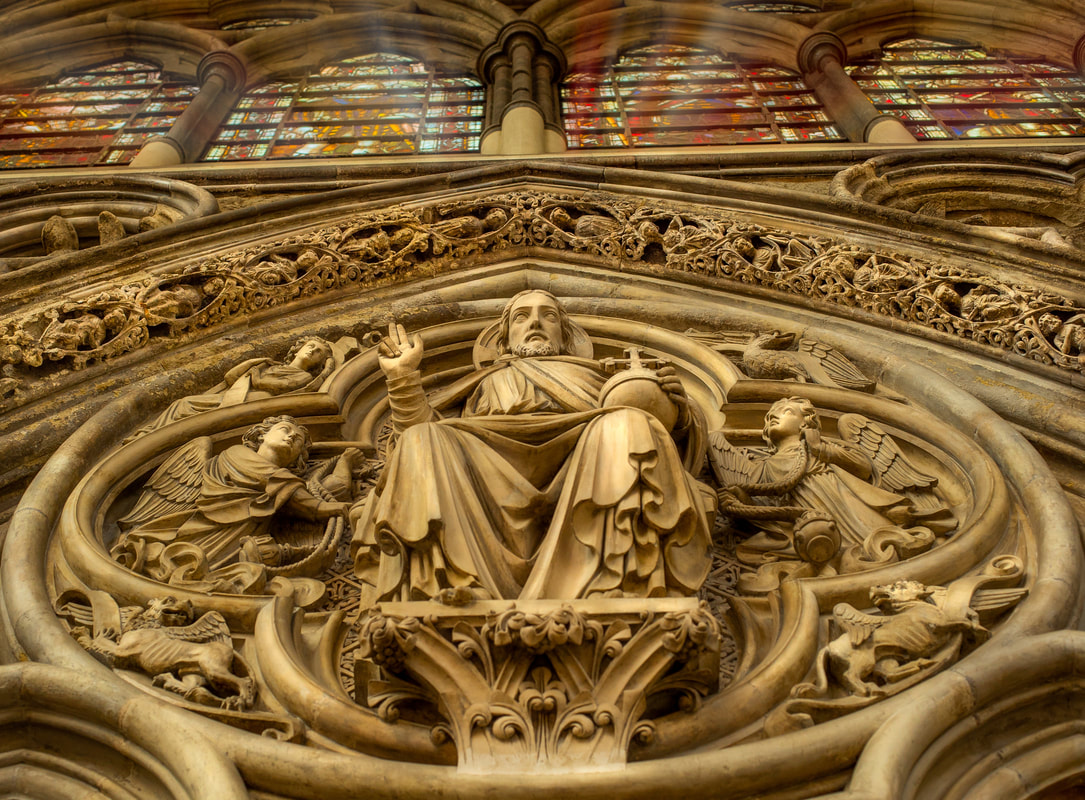
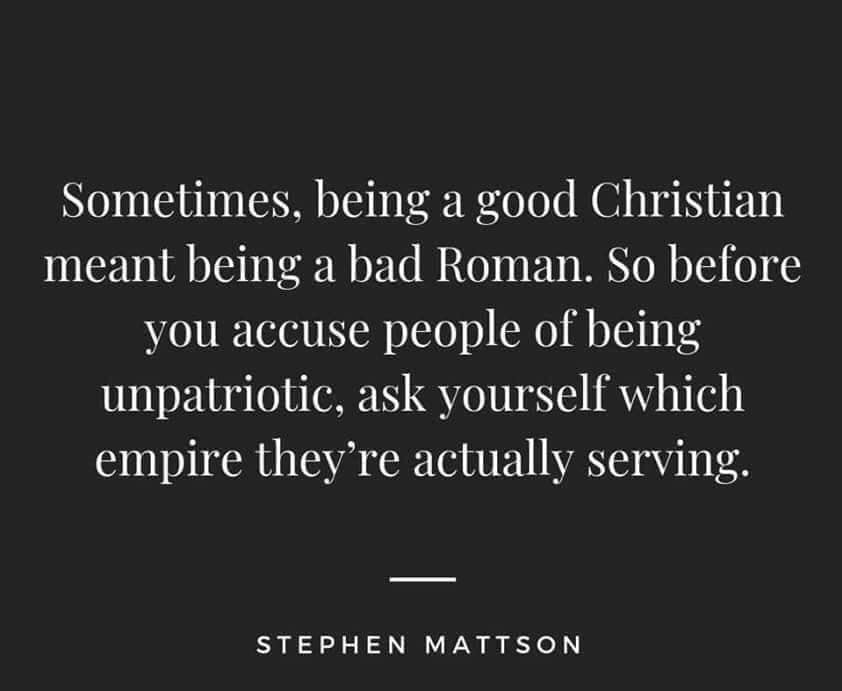

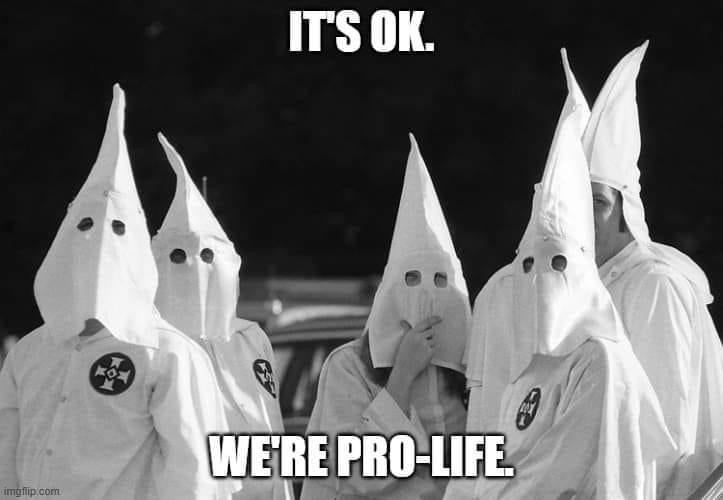


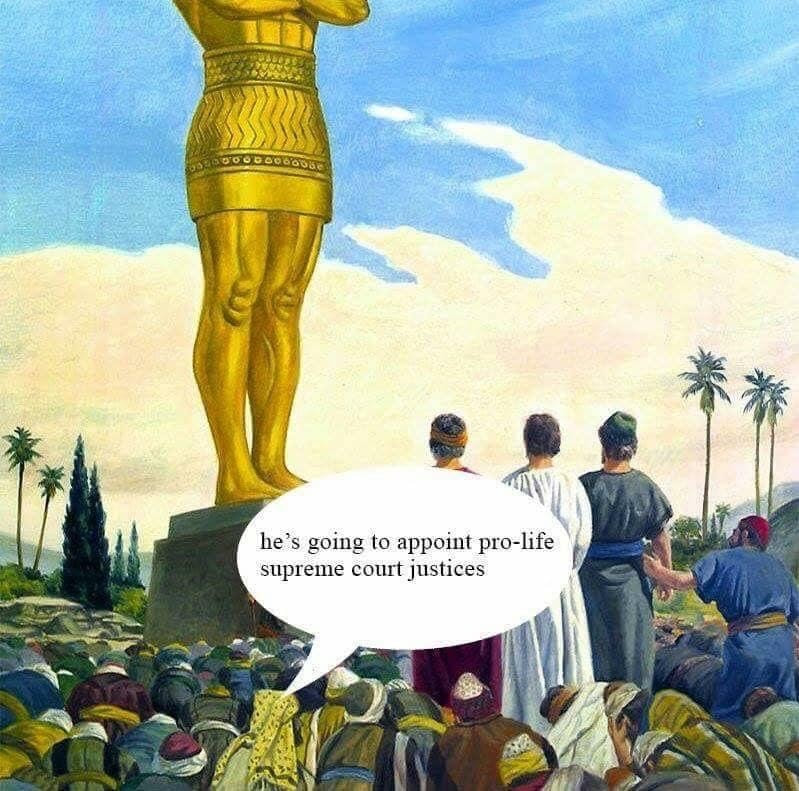

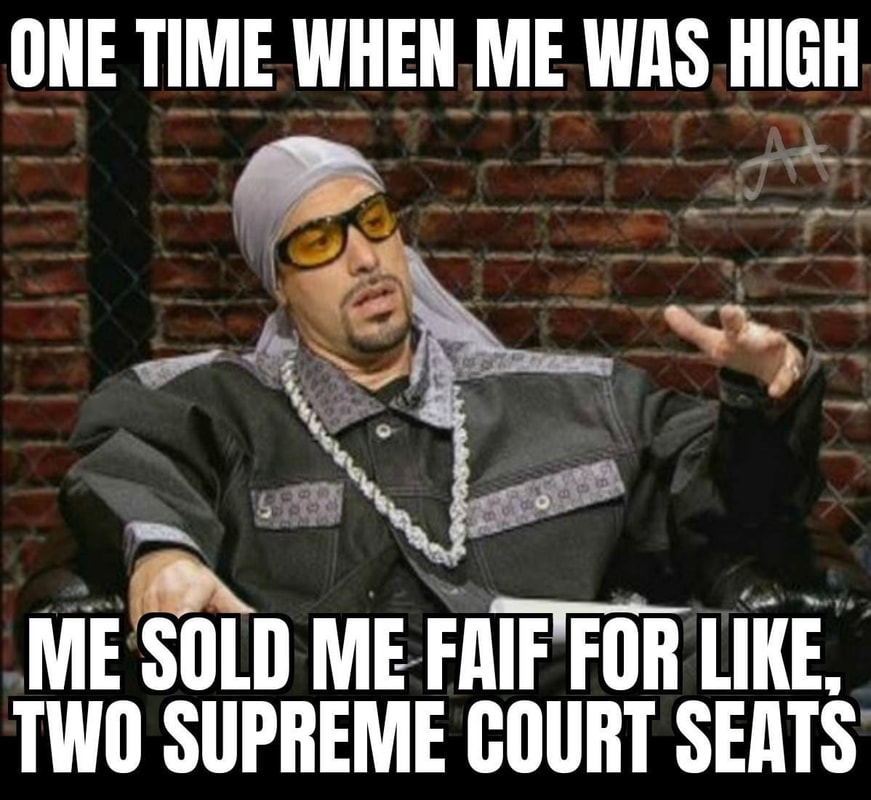

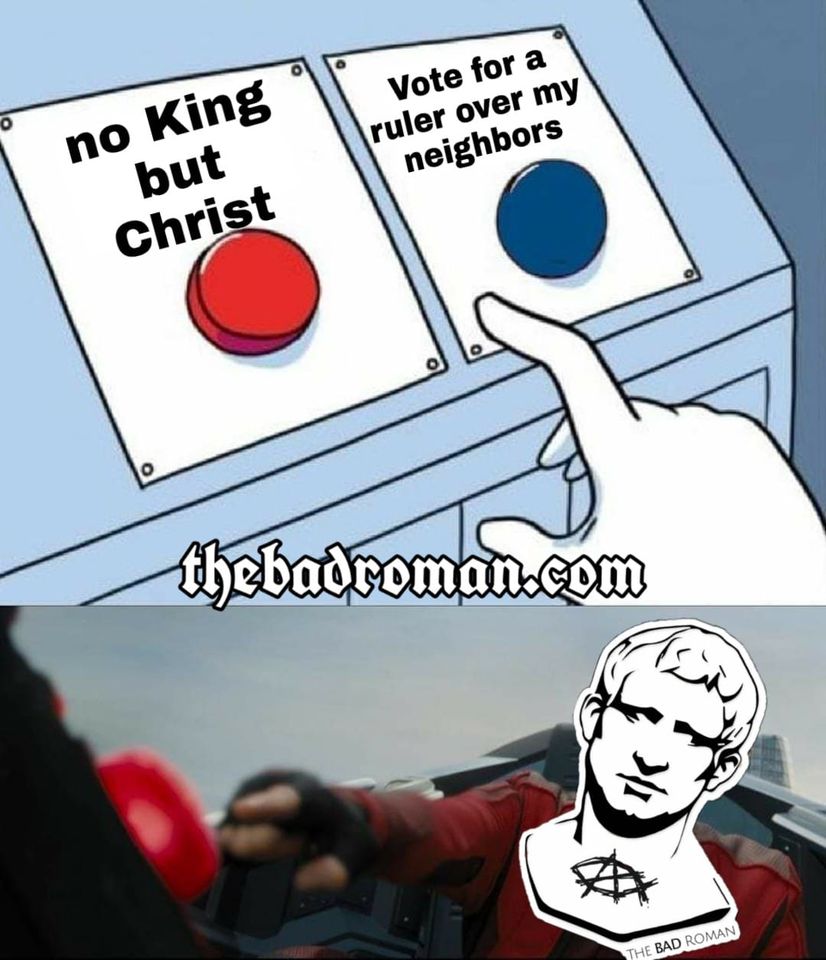

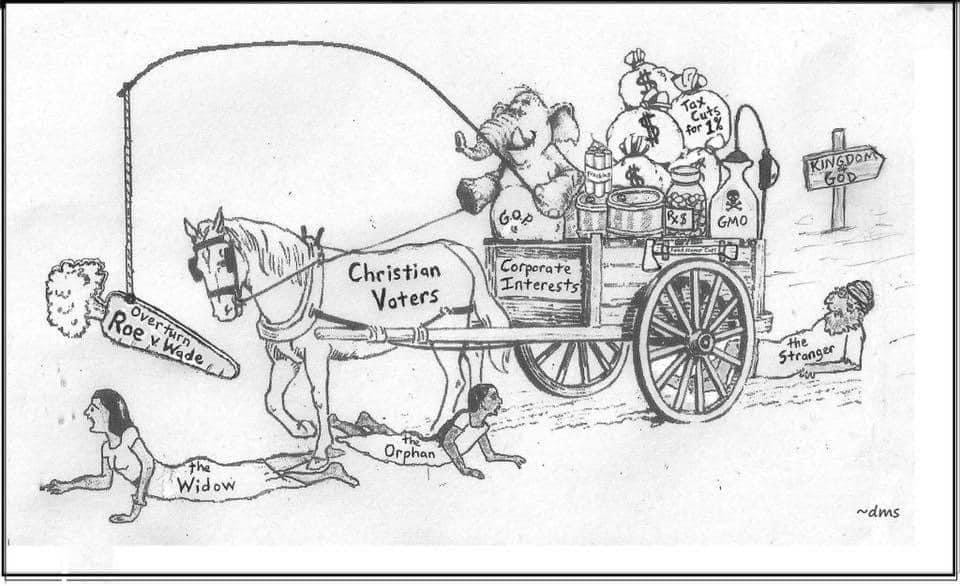

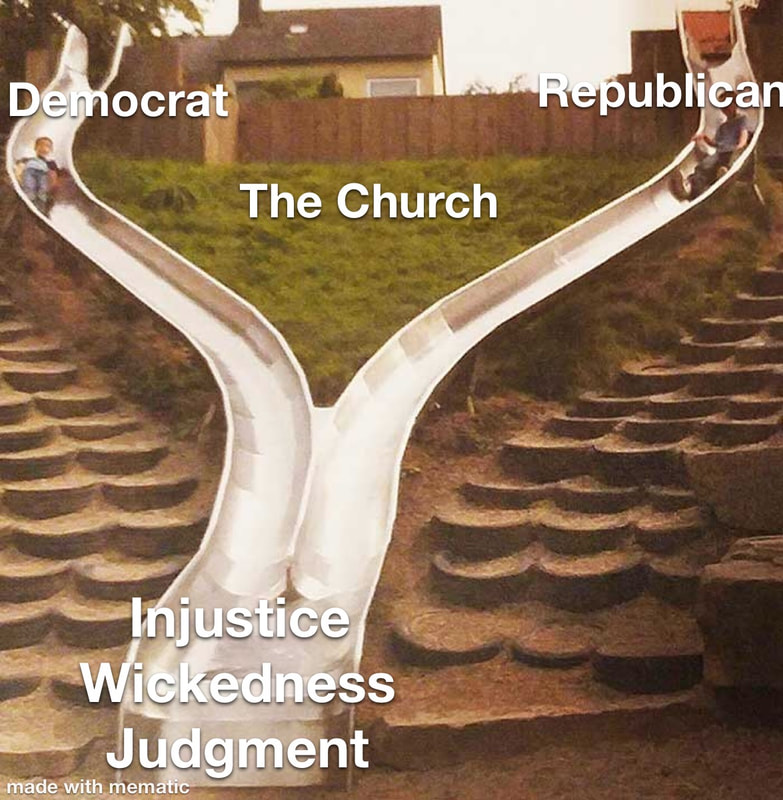






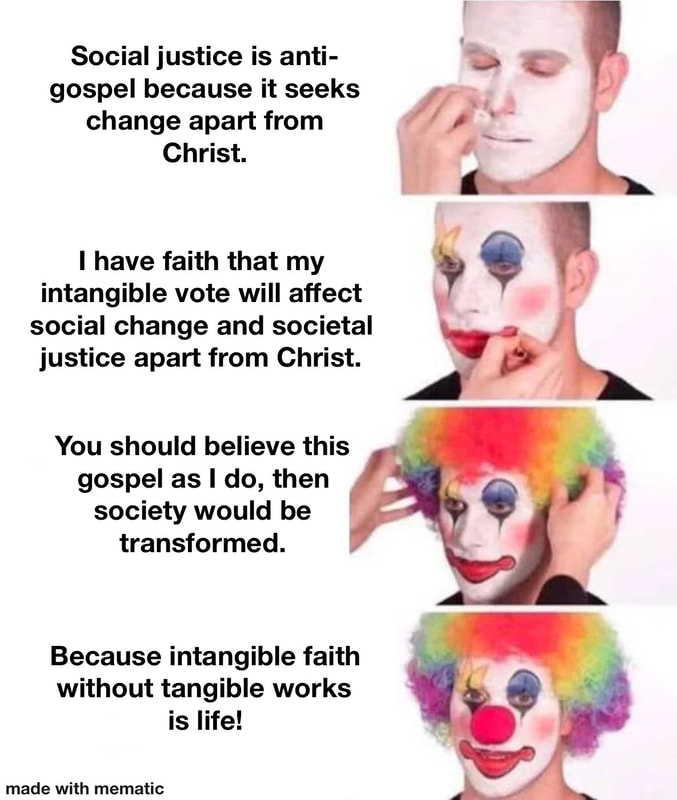
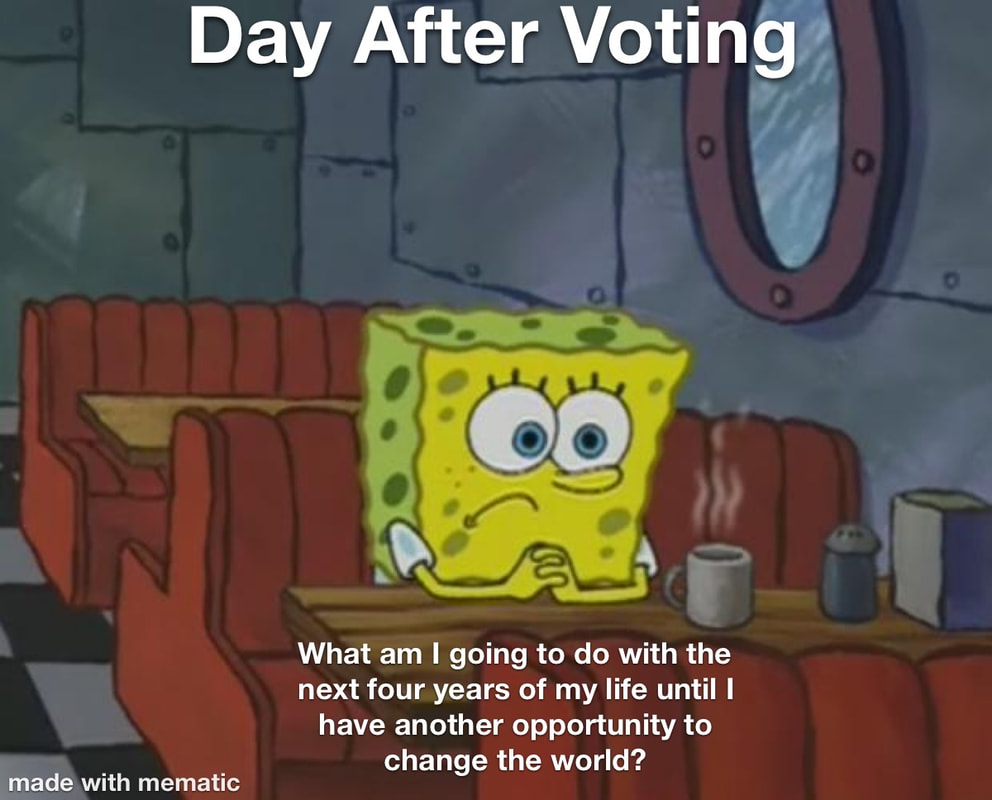



 RSS Feed
RSS Feed